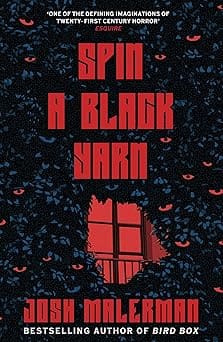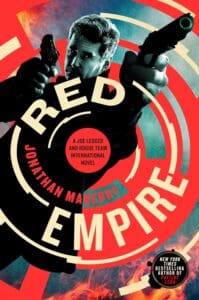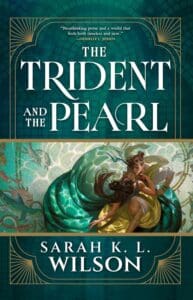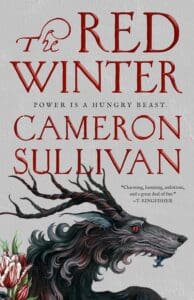
Synopsis:
Josh Malerman is a master weaver of stories-and in this spine-chilling collection he spins five twisted tales from the shadows of the human soul:
A sister tells her little brother that HALF THE HOUSE IS HAUNTED with a presence that only she can see, but is it her own mind that is haunted?
In ARGYLE a dying man confesses to crimes he never committed, and reveals long-kept secrets far more sinister than murder.
A tourist takes the ultimate trip to outer space in JUPITER DROP but the real journey is into his own dark past.
In DOUG AND JUDY BUY THE WASHER, a trendy married couple buys the latest home gadget only to find themselves trapped by the out-of-control machine… and each other.
And in EGOROV, a set of Russian triplets is devastated when one of the brothers is murdered; but will vengeance heal their pain?
Review:
I have, since “Bird Box,” known Josh Malerman to be a wonderful writer, but there’s something about his collection of novellas “Spin A Black Yarn,” that feels different. It’s difficult to articulate, at least without the metaphor of music. With these novellas Malerman seems to orchestrate more than write, every beat, every pause, every breath deliberate. I don’t think in recent memory, I’ve ever been so aware and appreciative of a writer’s rhythm and cadence. I allowed myself to be carried downstream by Malerman’s writing, admiring the grim Samhattan scenery as I went, and it was a dark and beautiful thing. “Spin A Black Yarn,” blew my mind, in terms of its prose, in terms of its imagery, in terms of its clever layers, subtle nods and sly winks, and proves Malerman to be, not merely a wonderful writer, but a real wordsmith, and a master of his craft, who can spin one hell of a yarn.
We begin with “Half The House Is Haunted,” 60 pages that span 74 years. This follows siblings Stephanie and Robin, who we’re introduced to when they’re 8 and 6 respectively. Stephanie seems to be a tormenter of considerable talent, swearing to her little brother that half the house is haunted. Naturally this could be a horizontal split, the ground floor and the basement or the third floor and the attic, perhaps vertical, half the corridor and the rooms on that side, or maybe it’s every other step, every other tile, every other brick. A hell of a hook to hang a story on, no? It’s an objectively genius, structurally apt, wholly original, and surprisingly optimistic take upon the haunted house and the mechanics of fear, and a hell of an opener, written… half in minor key.
Momentum is not lost with “Argyle,” a deathbed confessional. It follows Shaun Hasbro, a family man, who uses his last breaths to recount to his wife, children, and various guests the twisted desires he lived with. It’s not quite as architecturally ambitious as the story before it, a choice that I would argue to be both deliberate and to its credit. It’s quieter, and yet no less disquieting. It’s twisted and addictive, and evokes a certain paranoia when you look at your own parents, your own friends, your neighbours and colleagues and teachers, doctors and postmen, and realise you never really do know somebody completely. It feels similar in tone to “Inspection,” if you liked that one, and introduces a fugue of whispered secrets to the symphony Malerman’s conducting- yes I’m dragging this metaphor, right until the very end.
I think my personal favourite would have to be “Doug and Judy Buy The House Washer™.” It follows Doug and Judy Barman, who, as Josh so kindly and clearly lays out for us from the get go, are assholes. Rich assholes. They purchase an incredible new piece of tech, a dazzling luxury toy “The House Washer,” a device that, whilst the customer waits in a plexiglas tube, will fill your house with solution and clean it top to bottom. When, in anticipation of a party, the couple try it out though, the House Washer walks (drags) the pair down memory lane, as bitter reminders of who they were, and what they bartered away for all their material possessions, float on by. Ultimately a reminder that money does not buy happiness, and in fact affords scandal, “Doug and Judy Buy The House Washer™,” is satirical, comedic, claustrophobic and thematically packed. It starts as smooth jazz before descending into a frantic woodwind.
So far Malerman has kept us tethered to Michigan (in which he is slowly constructing a multiverse, and I love it) but in “Jupiter Drop,” he cuts the cord and sends us spiraling into the stratosphere. Steve Ringwald is guilt-ridden and alone, and when he sees advertised in “The Samhattan Daily News,” an intriguing voyage to and stay in the king of the planets, he realises, yes, he does have 26 months spare, and what is guilt if not gravity- and off he goes. A short, futuristic and strangely buoyant look at guilt and grief and the human psyche,”Jupiter Drop,” is the point where Malerman leans over the soundboard, to return once again to my music metaphor, bringing his symphony to strange new heights, chucking in some laser harp or synth or a jagged trumpet blast. It’s wacky.
The chunkiest of the bunch, and the bitter end, is “Egorov,” in which we return to Michigan, but this time travel backward a few decades, just in time to witness Pavel and Barat put their triplet brother Mikhail in a box. The entire family is devastated, but whilst some collapse inward, Pavel and Barat, and their father Grigory lash out, and need to exact vengeance upon the man who ripped their third from them. It’s a riveting tale of revenge, identity, death and perversion, secrecy and mystery with shades of Dostoevsky. It’s heavy on the strings.
Despite the time passed, the distance travelled, literally to Jupiter and back, the range of characters realised and changed and lost, Malerman’s symphony is a cohesive one, each novella a mini rhapsody, a distinct melody humming with similar notes of grief and fear and darkness, one might even indulgently say that the same black yarn is threaded through each of them.









Leave a Reply